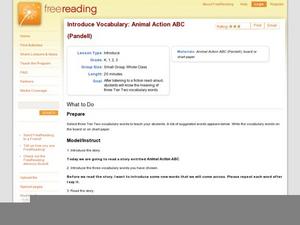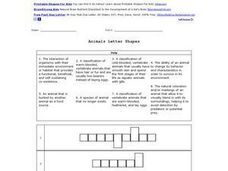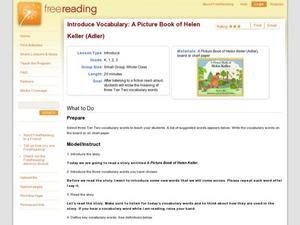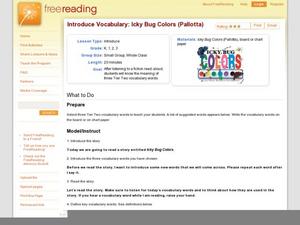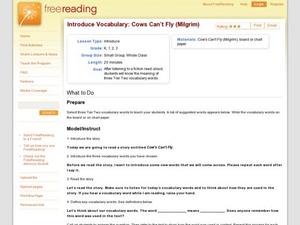Florida Center for Reading Research
Vocabulary: Word Meaning, Oh My Word!
Ever come across an unfamiliar word while reading and can't decipher its meaning? Use a worksheet and graphic organizer that tracks and helps bring meaning to unknown words as learners read a text. A worksheet and graphic organizer come...
Curated OER
Matching Science Words and Definitions About Animals
In this matching science words and definitions about animals worksheet, students match fifteen science words about animals with the definitions.
Curated OER
Introduce Vocabulary: Animal Tracks (Dorros)
What kind of animal made those tracks? Explore some wild vocabulary in context as learners listen to Arthur Dorros' book, Animal Tracks. Before your read this, introduce the new words like bother, dam, reed,...
Curated OER
Introduce Vocabulary: Animal Action ABC (Pandell)
Get your kinesthetic learners engaged in a vocabulary study using Karen Pandell's book, Animal Action ABC. They move around as you read, and raise their hands whenever they hear one of the words you are learning. Pre-teach the terms:...
Curated OER
Animals Vocabulary List and Definitions
For this animal words worksheet, students match 15 words pertaining to animals to their definitions in another column. These definitions are related to the general animal kingdom.
Curated OER
Science Types of Animals and Their Traits
Expose your students to the wonders of scientific vocabulary with this resource. Each slide contains a word and definition related to animal types and traits, concept vocabulary covered includes, traits, animal types, threatened,...
Curated OER
Greek and Latin Roots Lesson Plan: Create a Super Hero!
Students create a new super hero based on their knowledge of root words. In this word roots and origins lesson, students choose a Latin or Green root word to use as part of their super here name, then create a drawing and description of...
Curated OER
It's Greek To Me!
In this language lesson, scholars use Greek root meanings to determine the meaning of words. After being shown how Greek roots are used in many words, such as, photosynthesis, pairs are given two excellent black line masters embedded in...
Curated OER
Animals Letter Shapes
Add some excitement to a basic life science worksheet by using this simple word puzzle! Scholars read 8 definitions and write the correct animal-related vocabulary word in the boxes provided. The boxes for each definition show the...
Curated OER
Animals Word Search Puzzle
To make the classic word search more challenging and academic, this animal-terms puzzle has scholars solving clues to determine the words they find. Fifteen clues give detailed definitions of biology terms such as carnivore, reptile,...
Curated OER
Introduce Vocabulary: From Tadpole to Frog (Pfeffer)
Take an amphibious journey with budding readers as you explore vocabulary in Wendy Pfeffer's informative book From Tadpole to Frog. This text is the backdrop of a vocabulary exercise based on six words: fertilize, gills, hatch,...
Curated OER
Introduce Vocabulary: How Do Dinosaurs Say Goodnight? (Yolen and Teague)
If you are reading Jane Yolen's fun story How Do Dinosaurs Say Goodnight?, use these strategies to enhance the experience for budding readers. What new words will they learn? Find detailed comprehension questions for these in-text words:...
Curated OER
Introduce Vocabulary: A Picture Book of Helen Keller (Adler)
The story of Helen Keller is a fascinating one for young scholars; use it to practice reading comprehension and new vocabulary as learners listen to you read David Adler's picture book (hint: this strategy can be applied to any book)....
Curated OER
Introduce Vocabulary: Arthur's Baby (Brown)
Many of your youngsters have experienced a new baby coming home, and Marc Brown's story Arthur's Baby is a relatable way to cover some new vocabulary terms. Introduce and define the new words before reading the text aloud: adorable,...
Curated OER
Introduce Vocabulary: Icky Bug Colors (Pallotta)
Get to know the bugs around us with emerging readers who use Jerry Pallotta's informative book Icky Bug Colors to learn vocabulary in context. Address terms before reading the text aloud, preparing kids to listen for them later. Here,...
Curated OER
Introduce Vocabulary: Cows Can't Fly (Milgrim)
Cows can't fly, can they? David Milgrim's whimsical story makes vocabulary fun! Although this strategy can be used with any text, using Cows Can't Fly will be a breeze with this outline. Pupils are ready to raise their hands when they...
Curated OER
Introduce Vocabulary: Swimmy (Lionni)
Learn the importance of leadership as you explore vocabulary in context through Leo Lionni's book Swimmy, which can be found on YouTube in case you don't have it. This text includes some excellent vocabulary words for young readers,...
Curated OER
Introduce Vocabulary: Animal Action ABC
Explore the meanings of tier two vocabulary words. In small groups, young learners listen to a read-aloud story and evaluate new vocabulary words for their meaning.
Curated OER
Homophone Hunt
What is a homophone? Review the definition with your class before sending them off for this independent activity. As they read the story, they search for any homophones used incorrectly.
Curated OER
Animal Feeding Strategies
How do different animals eat? This cross-curricular worksheet has biologists describing types of eaters and giving examples. Eight short-answer questions prompt learners to identify a carnivore, herbivore, omnivore, insectivore,...
Curated OER
Aquatic Roots
Young scientist use reference materials to research various local aquatic plants and or animals to find out whether they are natives or exotics. They investigate their impacts on people, other animals and the environment. Students...
Curated OER
Lesson Two - Compound Words
Students complete activities with the book Sarah Plain and Tall. In this literature lesson, students read chapter two and complete attached activities. They list the compound words they find and study new vocabulary.
Prestwick House
Connotative vs. Denotative Meanings
Besides the dictionary definition, words also carry the added weight of meanings that are inferred or implied, meanings conferred on words, or connotations. To gain an understanding the importance of connotation, class members engage in...
Cornell University
Plant Cell Crime Scene
Use science to solve the mystery of the Poplar murder. Pupils use forensic botany to determine if a suspect could be the killer. By analyzing images from a Transmission Electron Microscope, learners determine if the material found on the...





